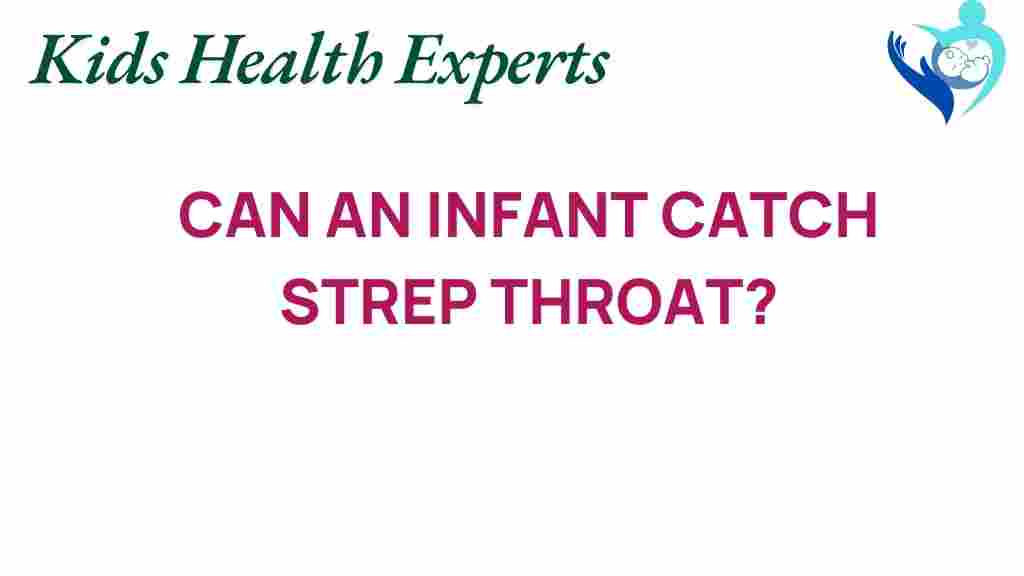Can Infants Catch Strep Throat? Unveiling the Myths and Facts
Strep throat is a common infection caused by the bacteria Streptococcus pyogenes, also known as group A streptococcus. While this condition primarily affects older children and adults, many parents wonder: Can infants catch strep throat? Understanding the facts and dispelling the myths surrounding strep throat in infants is crucial for ensuring the health and well-being of your child. In this article, we will explore the symptoms, prevention, and pediatric care associated with strep throat in infants, while also addressing common health myths.
Understanding Strep Throat
Strep throat is an infection of the throat and tonsils that can lead to various symptoms ranging from mild to severe. It is important to understand that strep throat is caused by bacteria, not viruses, which makes it different from other common throat infections.
Can Infants Catch Strep Throat?
Yes, infants can catch strep throat, although it is less common compared to older children. The risk increases as they become more exposed to other children, especially in settings such as daycare or preschool. However, their symptoms may differ from older children, making it essential for parents to recognize the signs.
Symptoms of Strep Throat in Infants
Identifying strep throat in infants can be challenging, as they may not be able to verbalize their discomfort. Here are some common symptoms to look out for:
- Fever: A high fever is often one of the first signs of strep throat.
- Red and swollen throat: Look for redness and swelling in the throat and tonsils.
- Pain while swallowing: Infants may cry or refuse to eat due to throat pain.
- Rash: Some infants may develop a rash known as scarlet fever.
- Change in appetite: A decrease in appetite or refusal to drink fluids can indicate discomfort.
- Irritability: Increased fussiness or irritability may also be a sign.
Health Myths About Strep Throat in Infants
There are several health myths regarding strep throat in infants. Understanding these can help parents make informed decisions about their child’s health:
- Myth 1: Infants cannot get strep throat.
Fact: While less common, infants can still contract strep throat. - Myth 2: Strep throat is just a sore throat.
Fact: Strep throat can lead to more severe health issues if left untreated. - Myth 3: Antibiotics are unnecessary for strep throat.
Fact: Antibiotics are essential to treat strep throat effectively.
Causes of Strep Throat
Strep throat is caused by infection with group A streptococci bacteria. The bacteria are highly contagious and can spread through:
- Direct contact: Touching surfaces contaminated with the bacteria.
- Respiratory droplets: Coughing or sneezing can spread the bacteria.
- Close contact: Sharing utensils, cups, or kissing can transmit the infection.
Preventing Strep Throat in Infants
Preventing strep throat in infants involves good hygiene practices and awareness. Here are some strategies to reduce the risk:
- Hand hygiene: Regular hand washing can help prevent the spread of bacteria.
- Avoid close contact: Keep infants away from individuals who are sick.
- Clean surfaces: Disinfect toys and surfaces regularly to minimize exposure.
- Teach older siblings: Encourage older siblings to practice good hygiene, especially if they are in school.
Pediatric Care for Infants with Strep Throat
If you suspect your infant has strep throat, it is crucial to seek pediatric care. Here’s what you can expect during a visit:
- Physical examination: The pediatrician will examine your infant’s throat and overall health.
- Rapid strep test: A quick throat swab may be performed to test for strep bacteria.
- Culturing: If necessary, a throat culture may be done to confirm the diagnosis.
Treatment for Strep Throat in Infants
The treatment for strep throat in infants typically includes:
- Antibiotics: If strep throat is confirmed, antibiotics will be prescribed to eliminate the bacteria.
- Pain relief: Over-the-counter pain relievers may be recommended to alleviate discomfort.
- Hydration: Ensure your infant stays hydrated, as they may refuse to drink due to throat pain.
Monitoring Symptoms and Recovery
After starting antibiotics, most infants will start to feel better within 24 to 48 hours. However, it is important to monitor their symptoms:
- Continue to watch for fever.
- Ensure they are eating and drinking adequately.
- Observe for any signs of complications, such as difficulty breathing or swelling.
When to Seek Emergency Care
In some cases, strep throat can lead to complications. Parents should seek emergency care if they notice:
- Difficulty breathing or swallowing.
- Severe swelling of the throat.
- Persistent high fever that does not respond to medication.
Conclusion
In summary, while strep throat is less common in infants compared to older children, it is still possible for them to catch this infection. Parents should be vigilant about recognizing the symptoms and understanding the myths surrounding strep throat. Ensuring good hygiene practices and seeking prompt pediatric care can significantly help in managing and preventing this infection.
For more information on child health and related topics, visit this resource. Additionally, you can learn about the latest research on infections at this external site.
By staying informed and proactive, you can help protect your infant from strep throat and other health issues, ensuring a healthier future for your child.
This article is in the category Conditions and created by KidsHealthExperts Team
